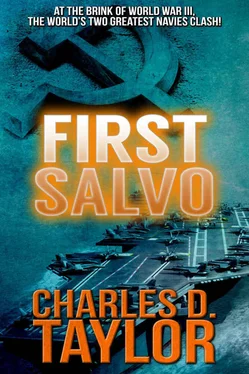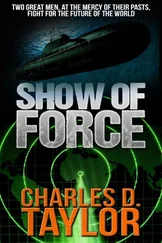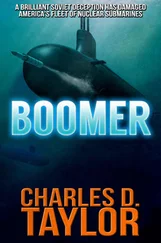As he chafed at the problem, he was also aware of the movement of the helo, now maneuvering above and behind his boulder. He backed around, and again the guns pounded away at the spot he’d just left. The one advantage he knew he had was that the helo could not easily shoot down on him from its position between the boulder and the snowfield. But he couldn’t crab his way around this boulder forever either. Sooner or later he’d make a mistake when there was no room for even one slight error. A ricocheting bullet could solve the enemy’s problem, and the odds were good that if they fired enough, sooner or later one would get him.
The thrust of the rotors saturated the air with dust and feathers. The mess penetrated his eyes and nose, and when he choked on it, it got in his mouth too. Through the haze, he could see the helo floating off to the other side, literally following him around the boulder. The guns let loose once more, kicking up the earth to either side as the craft bobbed in its own air currents.
Ryng slipped in the gravel as he skittered backward, sliding momentarily with the curve of the slope into the open. Frantically he rolled back to safety as the helo drifted into view. Shards of stone sprayed over him, penetrating his skin.
It was fast becoming a losing game for Bernie Ryng. There was no way a man could long protect himself from the hovering monster. Only instinct and the reactions he had left had protected him so far.
Now the copter was downhill from him again, with more room to raise or lower its target angle. It swung back and forth in the air as if suspended on a string, persistently firing short bursts whether or not he was in sight. The Russians, Ryng knew, understood the odds of the stray bullet as well as he did.
It was between the bursts of the helo’s machine gun that he heard another sound, something new added to the cacophony around him. Only, this was different, something alien to this snow-peaked, arctic hellhole. It was the screaming sound of a jet engine, and it was accompanied by a piercing shriek that he had rarely heard. The latter sound was followed by a tremendous burst below and to one side of the helo. It was much louder and many times more intense than the rockets that had been fired at him.
Ryng looked up to see a jet fighter spiraling into a high turn. He knew instantaneously that it was a Harrier fighter, recognizing vaguely the British colors on its tail. The explosion must have been an air-to-ground missile. Where the jet came from, or how, never entered his mind. Just the fact that the confrontation had evened out was all he cared about.
As the possibility began to overtake him that it might be a one-shot deal, a second fighter screamed down. Though its missile also missed its mark, Ryng was overjoyed to see that it came closer than the last.
He stared into the sky, wondering whether the first would return, and saw three others circling in a tight formation above. This was more like it. Now the helo was facing roughly the same odds as he had moments earlier. The odds that a third or fourth guided missile would miss its target were remote, and he waited with joy as he saw the first plane diving on its prey.
The pilot of the helo was no fool. Only by hugging the ground, hoping to confuse the missile guidance with the surface clutter, could he hope to survive. This time the helo began a series of wild cuts and dives, much as Ryng had been forced to do to avoid its deadly fire.
Whoever was piloting the first jet seemed to have little concern for his own safety. Since the Harrier could move at exceptionally slow speeds for a jet, it came in very low, picking a path that seemed to Ryng to be sure suicide, seeming to fly directly at the helo for a moment. As it pulled out of its flat pattern, climbing away from the mountain at the last minute, another missile was released.
There was little the Soviet pilot could do at that point. He lifted the copter straight into the air, perhaps hoping the missile would lock on the ground. But that was not to be as the heat-seeking missile locked on the helo’s engine exhaust and detonated at the rear of the craft.
Ryng rose to his feet to watch the helo cartwheel through the air, leaving a trail of black smoke. For a second, he thought it might recover. Then it pitched onto one side, careening into the hillside just below the snow line.
The second jet swooped low overhead, waggling its wings in recognition as Ryng waved back. Flying at a slow speed, it passed over the peak toward the sea and waggled its wings. Turning, it retraced its path, again passing over Ryng with a waggle, before flying over the mountaintop again. Then the two jets climbed with a roar to join the other three. Ryng was sure they were continuing on their way to pay a visit to the Russians at Longyearbyen. Of course there was no way word of the success of the SEAL team could have gotten back to the British. These Harriers were an independent last-ditch attempt to destroy the Russian base at Longyearbyen.
The question, he noted to himself, is, Where the hell did they come from? There was no way they could show up like the cavalry unless there was a carrier offshore, and that second waggle must mean I have a chance if I go over the top and slide down the other side to the beach. Just like that! Nothing made sense, at least not since this whole mess started when he and Denny were hit in their rubber boat. From that time on, he had been able to miraculously escape, each time figuring that the next round would be the last. Time and again, the idea of survival had been pounded into his skull, the idea that people could survive against the most amazing odds, but they had to want to live or there was no reason to run, or to fight back. Just keep at it as long as you have the ability to spit in their eye, they said, and you may just get out of it.
And he had. Or at least for the time being he had. But there was no time to waste. There must be other helos, and when this one didn’t return, they would send out another. And then his odds would plummet way down again. Forget it! He had no intention of taking any chances. Ryng, his stamina somehow regenerated, turned toward the peak and trotted off uphill into the snowfield on the path he’d selected before the helo had intercepted him. Though it was only half a mile to the top — if what he saw was indeed the top — it was a twisting path and could take half an hour, maybe an hour or more. He had no idea how hard or how deep the snow really was.
* * *
What Ryng also didn’t know was that the instant Colonel Bulgan had seen the Harrier diving at them, he had known the end was not far off. In fact, he decided that the American, Ryng, probably had better odds from the beginning than Bulgan had right now. Bullets only went in the direction they were fired, hopeful that their target would get in the way. Missiles preferred to seek out their target.
While his terrified pilot skewed the helo wildly about, perhaps afraid to realize how near the end was, Colonel Bulgan very carefully prepared as best he could for the inevitable. He plucked the grenades from his uniform, tossing them out the door to his right. No need to have one detonate under him if he survived the missile or the crash. Then he crammed the AK-74 under the seat, wrapping it tightly with his life jacket. Perhaps it might still function afterward. Then he cinched the safety straps even tighter around his chest until they seemed to stop his breathing. The last thing he remembered — about the same time the missile impacted — was grabbing the pilot’s life jacket and covering his head with it.
More than anything else, the life jacket did the job. It not only saved his head from the metal that flew about the cabin, but it protected his face and lungs from the searing heat. Finally, as the helo hit the ground on the pilot’s side, it protected his head when the seat ripped away from the deck and he hit the instrument panel. The other saving grace was the pilot. The man’s body was under Bulgan and absorbed the impact.
Читать дальше












